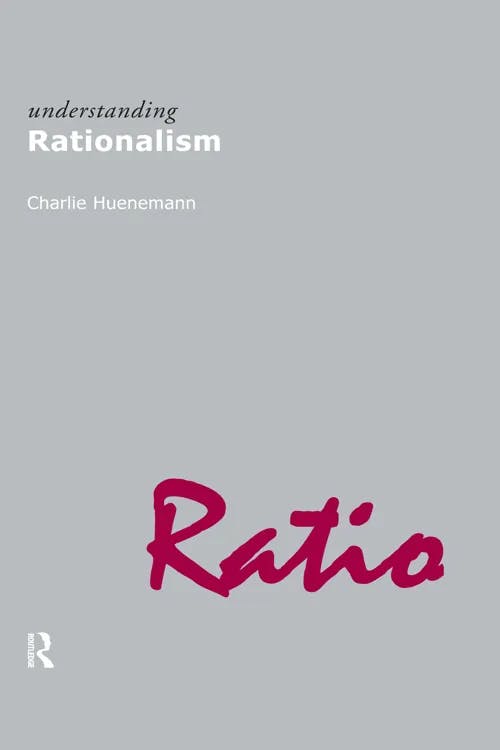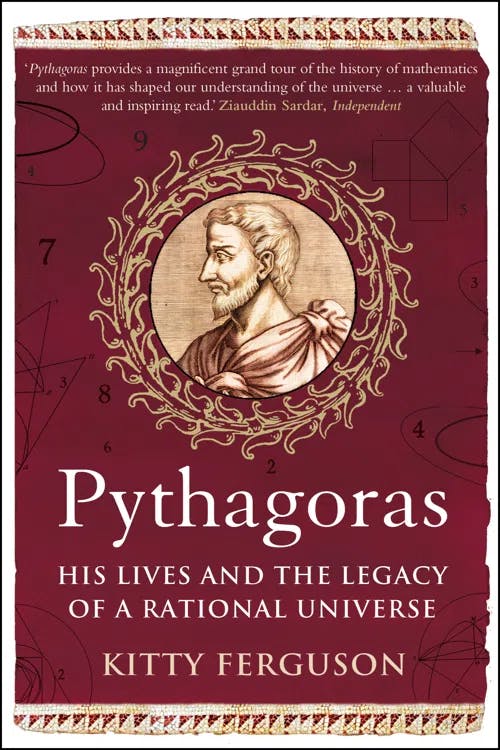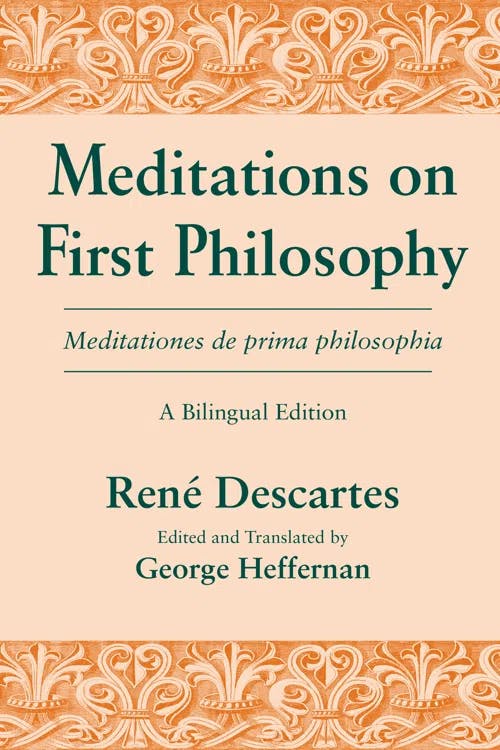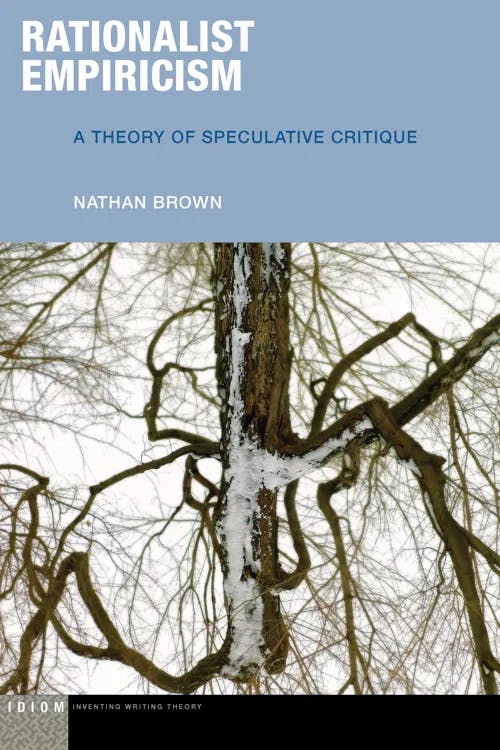What is Rationalism?
PhD, Media Arts (Royal Holloway, University of London)
Date Published: 29.08.2023,
Last Updated: 06.11.2023
Share this article
Defining rationalism
We have all likely heard the suggestion to “be rational.” This usually means to think or act in a way that is guided by reason. In philosophy, rationalism unpacks the faculty of reason, building a school of thought around the intellectual power of the mind.
Rationalism is one distinctive kind of answer to the philosophical question: how do we have knowledge? The field of philosophy dedicated to this question is known as epistemology and rationalism is a key player in Western epistemological history. Rationalism holds that, not only does reason have the power to generate substantive knowledge of the world, it also has the capacity to reflect on itself. So, by the use of reason we can come to understand features of the world, and features of our own minds.
One common way to define rationalism is through one of the great debates of Western philosophy: rationalism vs. empiricism. Empiricism is the epistemological position that all knowledge comes from sensory experience. For the empiricist, the mind is an empty receptacle that is only given content through experience of the world. According to empiricism, the faculty of reason only functions to manipulate impressions that originate in sensory experience. Rationalism accords much greater power to the faculty of reason.
Two philosophical distinctions serve to highlight the contrast between empiricism and rationalism, and thereby to help us better characterize rationalism: the innate / acquired distinction and the a priori / a posteriori distinction. Innate knowledge is knowledge that we are born with, and acquired knowledge is knowledge that is gained through experience. Naturally, empiricists find all knowledge to be acquired while rationalists think that we are already born with extensive knowledge of reality in the form of logic and reason.
The second distinction, a priori / a posteriori concerns the ways that a proposition can be known. A proposition can be known to be true a priori if knowing it does not depend upon prior experience. A proposition is said to be a posteriori if it can only be known through experience. For example, “post boxes are red” can only be known on the basis of experiencing the color of post boxes. It is an a posteriori proposition. But “nothing is both red and not red” can be known to be true independently of experience, by the use of reason alone. Even if you have never had the visual experience of red, you can know this statement to be true.
Rationalists and empiricists differ significantly over how much can be known a priori. For the rationalist much knowledge can be gained this way; for the empiricist only certain, limited kinds of propositions can be known by reason alone. Consider this example: “Bachelors are unmarried men.” This is clearly true, and you can know it even if you’ve never met a bachelor. You can know it merely by reflecting on the meanings of the terms “bachelor” and “unmarried men”; it is made true by the meanings of the words involved. In philosophy, this type of statement — one that is true by virtue of the meanings of the words — is known as “analytic.” Now consider the proposition “space is infinite.” This statement cannot be known simply by reflecting on the meanings of the words “space” and “infinite.” The concept of space does not contain the concept of infinite. Such statements are said by philosophers to be “synthetic.” They are substantive statements about the world.
With these distinctions in mind, the difference between empiricism and rationalism can be concisely summed up: empiricists believe that there are no synthetic a priori propositions while rationalists believe that there can be many. In other words, rationalists believe that substantive claims about the world can be made through reason alone.
This raises the question: what kinds of substantive claims can be known a priori, or by reason alone? And, what is innate knowledge? We will, in part, come to see how rationalists believe that claims about the nature of time and space, about causation, about mathematics, about morality, and about the nature of the human mind can be made by these methods.
The contention of rationalism that knowledge originates in the mind itself has significant consequences. It provokes the question: how can reason alone generate substantive knowledge of the world? Charlie Huenemann outlines the way that rationalists understand this relationship in Understanding Rationalism (2014), stating,
Broadly speaking, it is the view that the innermost skeleton of the universe and the innermost skeleton of the human mind are one and the same.
Charlie Huenemann
Broadly speaking, it is the view that the innermost skeleton of the universe and the innermost skeleton of the human mind are one and the same.
Rationalism holds that there are intrinsic structures in the world, structures that mirror the structures of our mind. There are existent facts, and the mind has the make-up to grasp them. Huenemann continues,
In short, rationalism holds that the human mind holds within itself the key for understanding the structure of ultimate reality. For the deepest knowledge of reality, it is sufficient to look within. (2014)
This is not to say that experience doesn’t help inform these rationalist ideas, or that empiricists must disagree with all aspects of intuition, deduction, and reason, but the rationalist idea is that these premises can be developed and tested a priori. Rationalists looked to concepts like mathematics and logic as proof of the existence of a priori knowledge. In these examples, conclusions could be drawn, and knowledge acquired, based on our ability to conceptualize and infer without relying on empirical evidence, resulting in the claim that knowledge can be gained through reason alone.
The following study guide will offer a historical overview of rationalism and introduce some of its key thinkers.
Early Greek rationalism
Rationalist thought, in a broad sense, can be found throughout history and has particular significance in ancient Greece. From the Pythagorean discovery of the formula to solve for the hypotenuse of a right-angle triangle, or that the pitch of a musical note depended on the tension and length of the string plucked, early Greek philosophers concluded “all things known have number – for without this, nothing could be thought of or known” (Philolaus, c. 5 AD [Pythagoras, 2011]). This discovery of these natural laws led Pythagorean philosophers to consider that the ability to reason with numbers is an innate capacity of the mind, and that numbers make up the substance of the world. In Pythagoras (2011), Kitty Ferguson describes his most significant contribution as the idea
that numbers are a pathway from human ignorance to an understanding of the deepest mysteries of a universe that on some profound level makes perfect sense and is all of a piece.
Kitty Ferguson
that numbers are a pathway from human ignorance to an understanding of the deepest mysteries of a universe that on some profound level makes perfect sense and is all of a piece.
This belief is an example of early rationalist thinking; that there are structures intrinsic to both mind and world and that these structures can be known a priori.
The findings of Pythagoras (c. 570 – c. 490 BC) and Philolaus (c. 470 – c. 385 BC) greatly influenced thinkers like Socrates (c. 470 – c. 399 BC) and Plato (c. 423 – c. 348 BC). Socrates’ interests in mathematics, logic, and reason have designated him as an early rationalist. He famously proposed that a life unexamined is not a life worth living. For Socrates, much of this examination process takes place in the universal and innate faculties of the mind, proving his rationalist position. Plato thought that the messy imperfect world we experience is just a pale reflection of the perfect, unchanging forms in heaven. He contended that, by using our reason, we can apprehend these divine forms (see our guide “What is Plato’s Theory of Forms?” for more). All these interwoven philosophical approaches unite under the premise that knowledge about the world can be acquired simply by the application of reason.
Descartes’ rationalism
One of the most significant modern rationalist philosophers was René Descartes (1596–1650). One of Descartes’ most crucial contributions to philosophy was his systematic doubt about all of his beliefs. Descartes found that it was easy to believe something to be true even if it was false, and this provoked him to throw out all his beliefs, rigorously test them one by one, and only continue to hold those that were indisputably true. This method is known as Cartesian doubt.
In aid of a thorough skepticism, Descartes developed several thought experiments that undermine sensory experience. In one such thought experiment, Descartes supposes that, instead of a good and loving God, there is an omnipotent evil “genius” or “demon” who is set on deceiving us. In his famous text Meditations on First Philosophy (1641, [1990]), Descartes writes,
I shall, then, suppose that not the optimal God—the font of truth—, but rather some malign genius—and the same one most highly powerful and most highly cunning—, has put all his industriousness therein that he might deceive me: I shall think that the heavens, the air, the earth, colors, figures, sounds and all external things are nothing other than the playful deceptions of dreams by means of which he has set traps for my credulity; I shall consider myself as not having hands, not eyes, not flesh, not blood, not any senses, but rather as falsely opining that I have all these things.
René Descartes
I shall, then, suppose that not the optimal God—the font of truth—, but rather some malign genius—and the same one most highly powerful and most highly cunning—, has put all his industriousness therein that he might deceive me: I shall think that the heavens, the air, the earth, colors, figures, sounds and all external things are nothing other than the playful deceptions of dreams by means of which he has set traps for my credulity; I shall consider myself as not having hands, not eyes, not flesh, not blood, not any senses, but rather as falsely opining that I have all these things.
Descartes contends that this demon could be so powerful as to create an entirely fabricated world of experiences that we mistake for reality, and we would never know. Empiricism contends that the senses are our most reliable source of information, but Descartes found the senses to be profoundly fallible. The same conclusion could be drawn when examining madness or dreaming; that our senses can lie to us and our experience might not correspond to fact. This led him to dismiss experience as the ultimate basis of knowledge.
Descartes applied this profound skepticism even to his own existence. He asked: if I cannot have knowledge of the existence of things provided by my senses, how can I trust my own existence? Descartes concluded that he could be absolutely sure of his existence because he had doubt. For the question of existence to arise, there must be a thinking entity that originates it. This thought process led to his famous axiom, published in Discourse on the Method (1637), “Cogito, ergo sum,” commonly translated to “I think, therefore I am.”
Descartes’ profound conclusion was an important example of what could withstand radical doubt. It confirmed the thesis that knowledge can be derived from the mind itself; from the faculty of reason. Furthermore, it confirmed that there must be two kinds of substance: mind and matter. Descartes could conceive of himself without a body, but he could not conceive of himself without the capacity to think. The dualism of mind and body is a classic example of synthetic a priori knowledge, a key feature of rationalism.
Leibniz’s rationalism
Among the most notable rationalists was Gottfried Wilhelm Leibniz (1646-1716). Significantly, Leibniz found his own method of proving the existence of God a priori; through reason.
Leibniz was a significant proponent of the principle of sufficient reason. Simply put, this principle states that all entities and things and events in the world must have a reason or cause; Leibniz claimed “nothing ever happens without there being sufficient reason for it” (1692). As Denis L. Sepper writes, the principle of sufficient reason is a
crucial notion in Leibniz, which states that everything that is or is possible must have reasons or causes sufficient to produce it precisely as it is. (Sepper, “Spinoza, Leibniz, and the Rationalist Reconceptions of Imagination,” A Companion to Rationalism, 2012)
Edited by Alan Nelson
crucial notion in Leibniz, which states that everything that is or is possible must have reasons or causes sufficient to produce it precisely as it is. (Sepper, “Spinoza, Leibniz, and the Rationalist Reconceptions of Imagination,” A Companion to Rationalism, 2012)
Leibniz proposed there were two types of truths: necessary and contingent. A necessary truth is a truth that cannot be false; for example, that a bachelor is an unmarried man. Under all circumstances, a necessary truth is true. A contingent truth describes something that is true not by definition but by circumstance. For example, that my cat is meowing is true, but not necessarily true; she could be sleeping, or, perhaps I might not have a cat at all. Because denying contingent truths would not necessarily entail a contradiction (not in the same way as arguing that, for example, 5 is not a prime number), they follow the principle of sufficient reason. This means that, for every contingent truth, there must too be a circumstance or reason that makes it so. For example, in order for my cat to be meowing, I must have made the decision to have a cat, that cat must want something from me, etc. These truths are contingent on circumstance, made true by cause.
Existence is a contingent truth; something can exist or not exist. So, for something to exist, like the self — as Descartes established it does — it must have sufficient reason. We are, as is the universe, a contingent entity. Hence, there must be something outside of ourselves, and the universe, that is the reason for our existence. This reason, Leibniz concluded, is God; God is the sufficient reason for existence. This is how Leibniz argues that we can have a priori knowledge of God. We can deduce God’s existence without having empirical, direct experience of it. Leibniz offers an example of how substantive knowledge claims about metaphysics can be proven with the intellectual, logical power of the mind. This shows how rationalism can be a solid means to knowledge.
Rationalism today
The dialogue between rationalism and empiricism has facilitated much philosophical development. When examining the nature of the mind, empiricist John Locke (1632–1704) proposed that the mind was a tabula rasa, a blank slate, waiting for experience to give it content. Leibniz responded, likening the mind instead to a block of marble whose grain determines the shape it takes on. Here, rationalism holds that the mind guides the way that experience imprints upon us. This dialogue is an example of how these debates develop ideas about the self and progress philosophical enquiry.
There are very few contemporary philosophers, however, who would claim to strictly follow a rationalist justification of knowledge. Following the influential work of Immanuel Kant (1724–1804), philosophers largely accept that the answers to epistemological questions are a synthesis of rationalism and empiricism. Nathan Brown briefly describes how this synthesis functions in Rationalist Empiricism (2021):
One aim of Kantian critique was to displace the opposition between rationalist and empiricist orientations through the invention of transcendental philosophy. Delimiting pure reason and refuting the immediacy of experience, Kant’s philosophy aimed to ground any possible experience in transcendental conditions while invalidating the direct application of reason to knowledge of objects beyond possible experience. The competing claims of rationalist and empiricist thinkers to the priority of either reason or experience would be countered by the priority of the transcendental.
Nathan Brown
One aim of Kantian critique was to displace the opposition between rationalist and empiricist orientations through the invention of transcendental philosophy. Delimiting pure reason and refuting the immediacy of experience, Kant’s philosophy aimed to ground any possible experience in transcendental conditions while invalidating the direct application of reason to knowledge of objects beyond possible experience. The competing claims of rationalist and empiricist thinkers to the priority of either reason or experience would be countered by the priority of the transcendental.
Kantian transcendentalism proposes that knowledge is constructed through sense impressions and organized in the mind by conceptual categories, creating a synthesis between the empiricist and rationalist positions.
That being said, strong trace elements of rationalism still influence thinking today. Take the innate vs. acquired debate, where rationalism contends that the mind has built-in faculties and empiricism refutes it. It seems clear now that both of these ideas are important in understanding the way that the mind and experience interact. In the field of philosophy of biology, for example, the concept of innate knowledge still holds, explained by evolution. For example, a baby knows to nurse in order to get food. It seems to be born with this knowledge; it has evolved to know how to do this. It is experience, however, that allows the baby to consciously grasp this way of feeding itself. From experience, the baby infers that if it reaches for its mother it will be fed. Hence, is it a synthesis between innate and acquired knowledge that explains this process.
The rationalists and empiricists alike endeavored to answer questions about what knowledge is and what its acquisition entails; an endeavor that is very much still underway. Rationalism looked to reason to explain the phenomena of knowledge, proposing compelling ideas in the pursuit of understanding how the mind works and our relationship to the world.
Further reading on Perlego
Descartes, Spinoza, Leibniz: The Concept of Substance in Seventeenth Century Metaphysics (2002) by Roger Woolhouse
Weber’s Rationalism and Modern Society: New Translations on Politics, Bureaucracy, and Social Stratification (2015) edited by Tony Waters and Dagmar Waters
The Renaissance and 17th Century Rationalism (2023) edited by G. H. R. Parkinson
Critics of Enlightenment Rationalism (2020) edited by Gene Callahan and Kenneth B. McIntyre
The Greeks and the Rational: The Discovery of Practical Reason (2022) by Josiah Ober
Reason and Rationality (2008) by Jon Elster
Rationalism FAQs
What is rationalism in simple terms?
What is rationalism in simple terms?
Who are the major rationalist thinkers?
Who are the major rationalist thinkers?
What is the difference between rationalism and empiricism in simple terms?
What is the difference between rationalism and empiricism in simple terms?
What are the best books on rationalism?
What are the best books on rationalism?
Bibliography
Brown, N. (2021) Rationalist Empiricism: A Theory of Speculative Critique. Fordham University Press. Available at: https://www.perlego.com/book/1440357/rationalist-empiricism-a-theory-of-speculative-critique-pdf
Descartes, R. (1990) Meditations on First Philosophy. University of Notre Dame Press. Available at: https://www.perlego.com/book/856235/meditations-on-first-philosophy-meditationes-de-prima-philosophia-a-bilingual-edition-pdf
Descartes, R. (2020) Discours de La Methode/Discourse on the Method. University of Notre Dame Press. Available at: https://www.perlego.com/book/2058646/discours-de-la-methodediscourse-on-the-method-a-bilingual-edition-with-an-interpretive-essay-pdf
Descartes, R. (2012) Principles of Philosophy. Barnes & Noble. Available at: https://www.perlego.com/book/3716024/principles-of-philosophy-barnes-noble-digital-library-pdf
Ferguson, K. (2011) Pythagoras: His Lives and the Legacy of a Rational Universe. Icon Books. Available at: https://www.perlego.com/book/569619/pythagoras-his-lives-and-the-legacy-of-a-rational-universe-pdf
Huenemann, C. (2014) Understanding Rationalism. Taylor and Francis. Available at: https://www.perlego.com/book/1666643/understanding-rationalism-pdf
Leibniz, G. W. (2016) Leibniz on God and Religion: A Reader. Bloomsbury Publishing. Available at: https://www.perlego.com/book/395087/leibniz-on-god-and-religion-a-reader-pdf
Leibniz, G. (2012) Discourse on Metaphysics and The Monadology. Dover Publications. Available at: https://www.perlego.com/book/111032/discourse-on-metaphysics-and-the-monadology-pdf
Leibniz, G. W. (1989) Leibniz: Philosophical Essays. Hackett Publishing Company, Inc. Available at: https://www.perlego.com/book/3899104/leibniz-philosophical-essays-pdf
Sepper, Denis, L. (2012) “Spinoza, Leibniz, and the Rationalist Reconceptions of Imagination,” in Nelson, A. (ed.) A Companion to Rationalism. Wiley. Available at: https://www.perlego.com/book/1007183/a-companion-to-rationalism-pdf
Spinoza, B. (2018) Treatise on the Emendation of the Intellect. Books on Demand. Available at: https://www.perlego.com/book/1782229/treatise-on-the-emendation-of-the-intellect-pdf
PhD, Media Arts (Royal Holloway, University of London)
Aoiffe Walsh has a PhD in Media Arts from Royal Holloway, University of London. With a background in film studies and philosophy, her current research explores British literary modernism, with a particular focus on surrealism between the wars. She has lectured and published pieces on documentary and film theory, film history, genre studies and the avant-garde.





